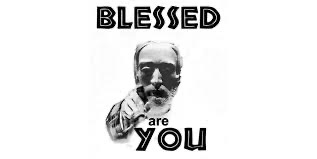Be-Attitudes?
This is the sermon I preached at St. Timothy Lutheran Church last Sunday. The text was Matthew 5:1-12.
Have you ever asked someone how they are, and they respond, “I’m blessed!” What often follows is a litany of all the wonderful things happening in their lives. Sometimes it makes us feel that we’re like chopped liver.
We see this too when there are disasters, whether because of weather or violence. When survivors are interviewed, they mention that they just kept praying, or it was God’s will to save them, or they’re just “blessed.”
What does that say about everyone else? Were those who died any less blessed by God? Didn’t God hear their prayers? Does God only save those who deserve it?
Jesus withdraws to a mountain to be alone with his disciples and to teach them. That’s an important characteristic of Jesus in Matthew’s story – he is a teacher, an interpreter of God’s law, meeting with his disciples on the mountain like a new Moses training the twelve disciples in a new kind of righteousness. And the first thing Jesus teaches them is how to recognize blessedness. The usual suspects are not necessarily the blessed ones. Jesus teaches his disciples to see how God calls blessed those who are down and out, distressed by their circumstances, passionate about promoting righteousness and working for peace, or persecuted for doing the right thing (David Lose).
The Beatitudes are full of blessing, but it’s not the kind that people glibly say when things are going well in their lives. Some Bible translations use the word “happy” instead of blessed, but the blessedness of which Jesus is speaking is far more than mere happiness. We experience happiness when all is well in our world. But all is not well for some people mentioned in this portion of the Sermon on the Mount, the outsiders.
Another way to look at blessing according to scholars is “honorable.” Jesus is speaking to real people who are right in front of him, and he is talking to them about their actual current circumstance. What Jesus does condemn is the all too human weakness to confuse our wants and our needs. Jesus is not saying that being poor or hungry or sorrowful is a blessing. All of these will be reversed. But being hated, being hated “on my account,” now that IS a blessing. For that is a sign that you are among the company of God's true prophets.
“Fortunate” or “it will be well with” is another way to understand Jesus’ meaning in “blessed.” “Blessed are those who”—gives its blessing, it is not urging or an exhortation to be this or that. God pronounces God’s blessing, and the language is performative, meaning God does it (Fred B. Craddock). By virtue of Jesus’ calling someone blessed, he is blessing them.
According to the Theological Lexicon of the New Testament: It is impossible to insist too strongly on the meaning of this [blessedness] … This is much more than contentment; it is an interior joy that becomes external, elation translated into shouts, songs, acclamations. … the new faith implies a reversal of all human values; happiness is no longer attached to wealth, to having enough, to a good reputation, power, possessions of the goods of this world, but to poverty alone.
What does this mean for us? If you think what Jesus has set out to teach us today is impossible to do, you’re absolutely right. We aren’t like the people of Jesus’ day, or are we? Did you hear the words of the first reading? They go hand in hand with the Beatitudes.
26 Consider your own call, brothers and sisters: not many of you were wise by human standards, not many were powerful, not many were of noble birth. 27 But God chose what is foolish in the world to shame the wise; God chose what is weak in the world to shame the strong; 28God chose what is low and despised in the world, things that are not, to reduce to nothing things that are, 29 so that no one might boast in the presence of God. 30 He is the source of your life in Christ Jesus, who became for us wisdom from God, and righteousness and sanctification and redemption, 31 in order that, as it is written, “Let the one who boasts, boast in the Lord” (1 Cor. 1:26-31).
The blessed were not the biggest, the best, the richest or the brightest. They were ordinary people, primarily on the margins of society. No matter who we are, whatever our situation is, God wants to bless us so that we can bless others.
There are many outsiders in our society: the addicts, homeless, immigrants, the poor. Can we embrace them and see in them those whom Jesus names blessed: the poor in spirit, the mourning, the meek etc.? How can we bless them so that they may be comforted, filled and called children of God? We support agencies and programs that do this such as Five Loaves and Two Fish, St. Susan’s Kitchen and UCAN. If we are able, can we roll up our sleeves and get our hands dirty by actually being involved in some way?
What about the people in our pews? Does someone look troubled? Talk and pray with them. Who is missing? Can we give them a call and visit with them? Jesus’ words were not only for the disciples of old, but for us as today’s disciples as well. We can be instruments of God’s blessing to all.
Amen.
Resources
Fred B. Craddock, Preaching Through the Christian Year A
David Ewart, holytextures.com
David Lose, davidlose.net
Ceslas Spicq, Theological Lexicon of the New Testament



Comments